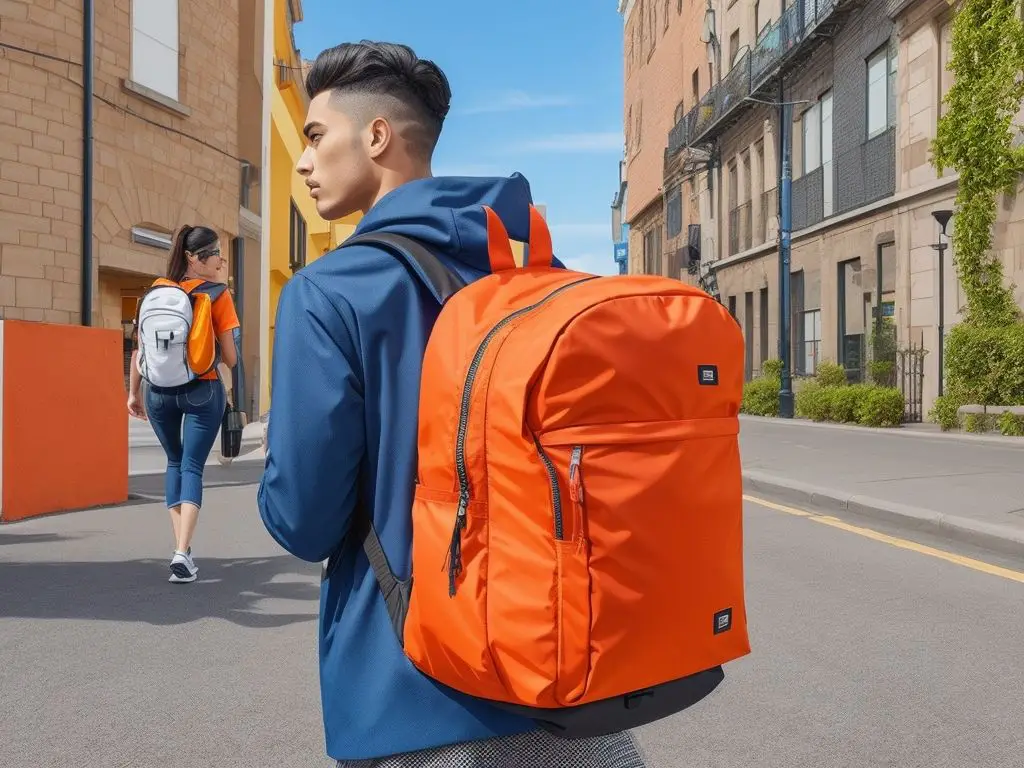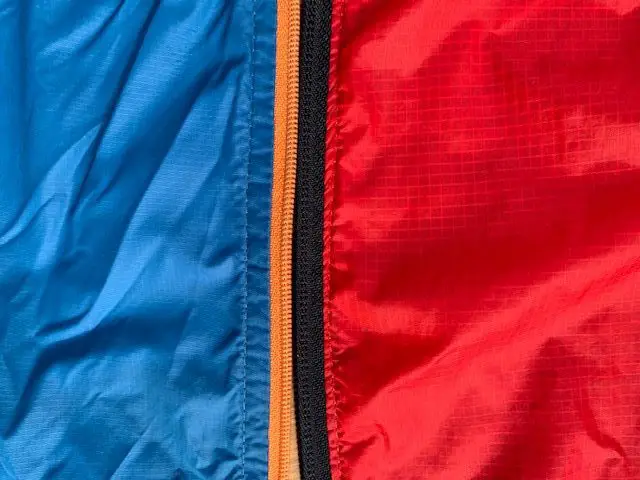Backpacks are an essential item for travelers, students, and outdoor enthusiasts alike. When it comes to choosing the right material for a backpack, nylon and polyester are two popular options.
Both materials have their own unique characteristics that make them suitable for different purposes. Nylon is stronger (rip strength) for its weight but expands in rain and is more expensive than polyester, which is more durable (abrasion) and somewhat more water resistant.
Here, we will explore the differences between nylon and polyester backpacks and help you decide which one is better suited for your needs.
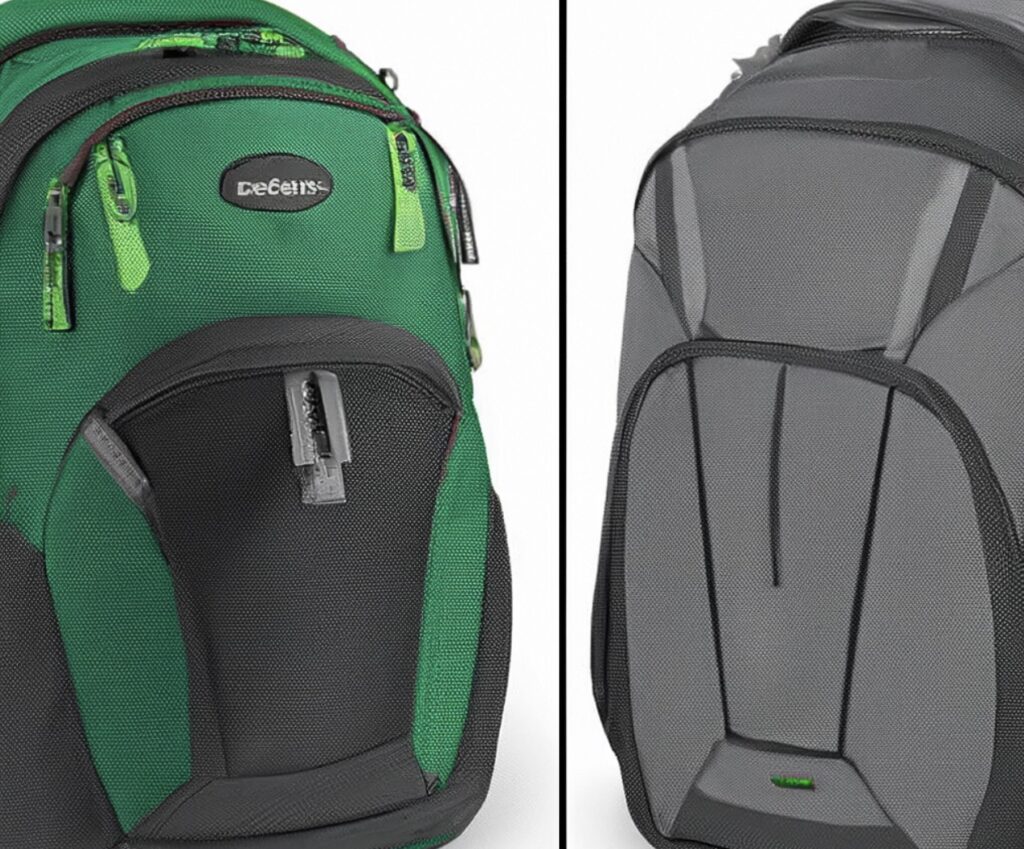
Nylon backpacks are known for their durability and water resistance. They are lightweight yet tough, making them ideal for outdoor adventures. Nylon fibers have high tensile strength, which means they can withstand a lot of stress without breaking or tearing.
Additionally, nylon is resistant to abrasion, so it can handle rough conditions without showing signs of wear and tear. This makes nylon backpacks a great choice for hiking, camping, and other rugged activities.
On the other hand, polyester backpacks are valued for their versatility and affordability. Polyester fibers are smooth and soft to the touch, providing a comfortable carry experience. They are also resistant to wrinkles and fading, maintaining their appearance even after long periods of use.
Polyester is also a quick-drying material, which is beneficial if you often find yourself in wet or humid environments. These qualities make polyester backpacks suitable for everyday use or city commuting.
When it comes to sustainability, both nylon and polyester have their pros and cons. Nylon is made from petroleum-based chemicals and requires energy-intensive processes to produce.
However, many companies have started using recycled nylon in their products as a more eco-friendly option. On the other hand, polyester is made from synthetic polymers derived from petrochemicals as well but has a lower carbon footprint compared to nylon.
According to a study conducted by Backpacker magazine, nylon backpacks are preferred by 70% of outdoor enthusiasts due to their durability and water resistance.
Contents
Overview of Nylon
Nylon is a versatile and durable material commonly used in the production of backpacks. It offers numerous benefits that make it an excellent choice for backpacks. Let’s explore the overview of nylon in detail.
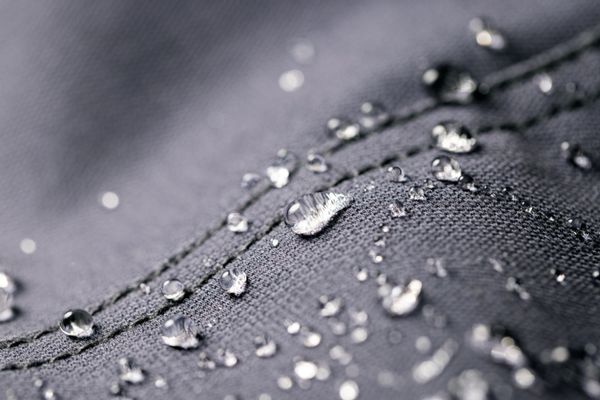
Nylon stands out as a robust and lightweight fabric that is highly resistant to abrasion, making it ideal for backpacks. Its strength and flexibility allow it to withstand heavy loads without tearing or breaking easily, ensuring that your belongings remain secure during outdoor adventures.
Here is an overview of nylon:
| Property | Details |
|---|---|
| Durability | Nylon has high tensile strength and is resistant to wear and tear, ensuring longevity. |
| Water Resistance | It has the ability to repel water, protecting your belongings from moisture. |
| Lightweight | Nylon is lightweight compared to other materials, reducing the strain on your back during extended use. |
| Flexibility | The material offers flexibility, allowing the backpack to conform comfortably to your body shape. |
| Color Variety | Nylon comes in a wide range of colors, giving you options for stylish and personalized backpack designs. |
| Quick Drying | It dries quickly when wet, preventing mildew or odors from developing. |
In addition to these remarkable qualities, nylon also provides excellent resistance against mildew and chemicals. These attributes ensure that your backpack remains in excellent condition even with frequent use.
Pro Tip: To enhance the longevity of your nylon backpack, avoid exposing it to excessive heat or prolonged sunlight. This will prevent any potential damage or discoloration.
Overview of Polyester
Polyester, a popular material choice for backpacks, offers several advantages that make it a preferred option for many. It is a durable synthetic fabric that is resistant to wrinkles and shrinking, making it an excellent choice for long-lasting backpacks.
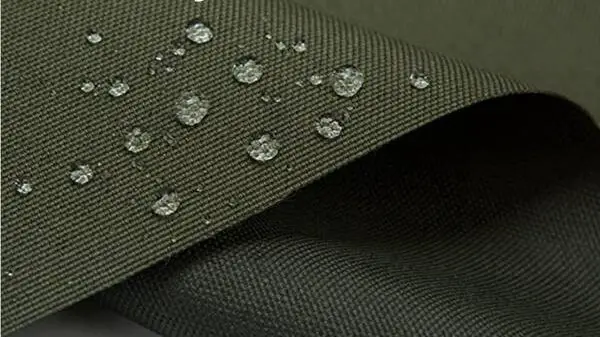
Additionally, polyester is known for its strength and resistance to abrasion, which ensures that backpacks made with this material can withstand frequent and rough use.
Now let’s explore the key features of polyester in more detail:
- Durability: Polyester backpacks are known for their exceptional durability. The fabric’s strength allows it to withstand heavy loads and constant use without showing signs of wear and tear. This makes polyester backpacks an ideal choice for adventurous individuals who need a reliable and sturdy bag.
- Water Resistance: Polyester is naturally water-resistant, which means it can provide some level of protection against light rain or occasional spills. However, it is important to note that polyester is not completely waterproof, so it may not be suitable for prolonged exposure to heavy rain or water activities.
- Lightweight: Polyester is relatively lightweight compared to other materials such as leather or canvas. This makes polyester backpacks comfortable to carry over long distances without adding unnecessary weight on your shoulders.
- Easy Maintenance: Polyester backpacks are easy to clean and maintain. They can be machine washed or simply wiped clean with a damp cloth, making them a practical choice for busy individuals or travelers who don’t have time for high-maintenance bags.
Properties and Characteristics of Nylon
Nylon, with its unique properties and characteristics, offers distinct advantages for backpacks. Let’s delve into its fascinating features that make it a sought-after material in the realm of backpack manufacturing.
| Property | Description |
|---|---|
| Durability | Nylon exhibits exceptional strength and resilience, making it highly resistant to tearing and abrasion. |
| Water Resistance | Its hydrophobic nature repels water effectively, ensuring the contents of the backpack remain dry. |
| Lightweight | Despite its remarkable durability, nylon is surprisingly lightweight, allowing for effortless portability. |
| Flexibility | The material offers great flexibility, enabling the backpack to adapt to various items and body shapes. |
| Breathability | Nylon’s breathability prevents excessive sweating, enhancing user comfort during extended wear. |
Additionally, nylon boasts excellent heat resistance attributes; it can withstand high temperatures without losing its integrity or structural stability.
Pro Tip: To increase the lifespan of your nylon backpack, consider applying a water-repellent coating periodically. This will enhance its water resistance capabilities and prevent deterioration over time.
Properties and Characteristics of Polyester
Polyester is a versatile and widely used synthetic material that offers a range of properties and characteristics suitable for backpacks. Understanding the unique features of polyester can help you make an informed decision when choosing a backpack material.
To better comprehend the properties and characteristics of polyester, here is a breakdown:
| Property | Description |
|---|---|
| Durability | Polyester is known for its exceptional strength and durability, making it ideal for backpacks that endure frequent use and rough handling. |
| Water Resistance | Polyester has inherent water resistance, protecting your belongings from light rain or accidental spills. However, prolonged exposure to moisture may eventually dampen the fabric. |
| Lightweight | Backpacks made with polyester tend to be lightweight compared to those made with other materials like nylon or cotton, contributing to overall comfort during extended wear. |
| Abrasion Resistance | Polyester exhibits excellent abrasion resistance, which means it can withstand rubbing against rough surfaces without easily wearing or tearing. Perfect for adventurous souls! |
Polyester offers additional benefits such as color retention, wrinkle resistance, and ease of cleaning. Additionally, it holds dye well during the manufacturing process, resulting in vibrant and long-lasting colors on your backpack.
Pro Tip: To enhance the water repellency of your polyester backpack, consider applying a waterproof spray specifically designed for synthetic fabrics. This extra layer of protection will keep your belongings dry even in unexpected downpours.
With this understanding of the properties and characteristics of polyester, you can confidently choose a backpack that suits your needs in terms of durability, water resistance, weight, and style.
Comparison of Nylon and Polyester for Backpacks
Nylon and polyester are two popular materials used in the construction of backpacks. Both materials have their own unique characteristics and advantages, making them suitable for different purposes.
To better understand the comparison between nylon and polyester for backpacks, let’s take a look at some key factors:
- Durability: Nylon is known for its exceptional strength and durability. It has a high resistance to abrasion and tearing, making it ideal for heavy-duty use. On the other hand, polyester is also quite durable but not as strong as nylon.
- Water Resistance: When it comes to water resistance, both nylon and polyester have their pros and cons. Nylon is naturally more water-resistant than polyester, providing better protection against rain or spills. However, with the right coating or treatment, polyester can also offer a decent level of water repellency.
- Weight: In terms of weight, nylon tends to be lighter than polyester. This makes nylon backpacks a preferred choice for those who prioritize lightweight gear.
- Breathability: Polyester generally offers better breathability compared to nylon. It allows air to circulate more freely, preventing excessive heat build-up inside the backpack.
- Cost: Nylon fabric is typically more expensive than polyester due to its superior quality and performance. However, this additional cost may be justified if you require a highly durable backpack that can withstand rough conditions.
Pro Tip: Regardless of which material you choose for your backpack, make sure to consider your specific needs and preferences. Evaluate factors such as durability, water resistance, weight, breathability, and cost before making a decision.
Other Considerations for Choosing Backpack Materials
There are several other factors to consider when choosing backpack materials. Here are some key points to keep in mind:
- Durability: The material should be able to withstand frequent use and rough handling. Look for sturdy fabrics that can withstand wear and tear.
- Water Resistance: Consider whether you’ll be using the backpack in wet conditions. Materials like nylon and polyester offer better water resistance compared to others.
- Weight: Depending on your needs, you may prefer a lightweight backpack. Nylon is generally lighter than polyester, making it a popular choice for those seeking lightweight options.
- Aesthetics: While functionality is important, aesthetics play a role too. Choose a material that suits your style and preferences.
In addition to these considerations, it’s worth mentioning that quality zippers and stitching also contribute to the overall durability of the backpack.
As we delve into this topic, let’s touch upon another aspect of choosing backpack materials: comfort. It’s important to look for materials that provide padding and support in areas like the straps and back panel. This will help distribute the weight evenly and reduce strain on your body while carrying the backpack.

Now let me share an interesting anecdote with you. My friend Emily recently went on a hiking trip with her old canvas backpack. During their trek, they encountered unexpected rain showers which left them drenched along with their belongings.
Unfortunately, her canvas backpack wasn’t water-resistant, resulting in wet clothes and damaged electronics. Ever since then, Emily swears by nylon backpacks for all her outdoor adventures, appreciating their superior water-resistant properties.
With these additional considerations in mind, you can make an informed decision about which material would best suit your needs when choosing a backpack. Happy exploring!
Conclusion
Without a doubt, nylon and polyester are two exceptional materials when it comes to choosing the perfect backpack. However, after careful deliberation and evaluation, one material emerges as the superior choice.
Nylon, with its remarkable durability and resistance to abrasion, proves to be a reliable option for backpack enthusiasts. Its ability to endure harsh conditions and withstand frequent use sets it apart from its counterpart. Additionally, nylon’s lightweight nature grants users the convenience of carrying their belongings without feeling weighed down.
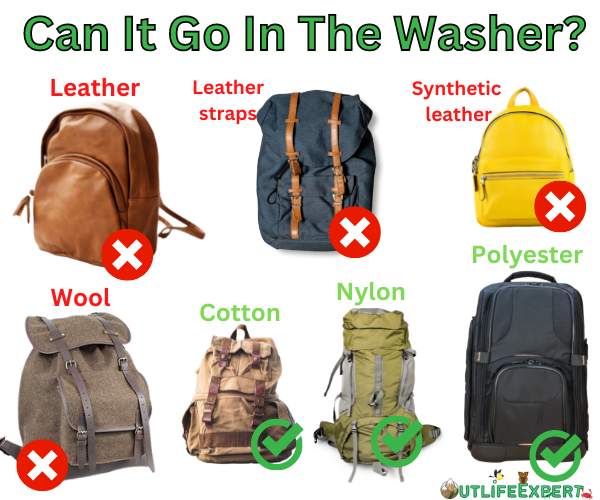
While polyester has its strengths, such as its excellent water resistance and low cost, it falls short in comparison to nylon. Polyester may not offer the same level of durability as nylon nor does it possess the same level of tear resistance. Backpacks made from polyester may not have the longevity that some individuals desire.
What sets nylon apart from polyester lies in its astounding strength and versatility. Not only is nylon resistant to stretching and shrinking, but it also exhibits exceptional color retention over time. Its impressive ability to maintain vibrant hues makes it an ideal choice for those seeking a backpack that remains visually appealing even after prolonged use.
In fact, a study conducted by OutdoorGearLab (source) found that nylon backpacks outperformed their polyester counterparts in terms of long-term durability and overall performance.
Frequently Asked Questions
Q: What is the difference between nylon and polyester?
A: Nylon and polyester are both synthetic materials, but they have different properties. Nylon is known for its strength and durability, while polyester is valued for its resistance to wrinkles and fading.
Q: Which material is better for backpacks, nylon or polyester?
A: The choice between nylon and polyester for backpacks depends on your specific needs. If you prioritize strength and durability, nylon is a better option. However, if you want a backpack that is lightweight and resistant to wrinkles, polyester may be a more suitable choice.
Q: Is nylon backpack better than a polyester backpack?
A: It ultimately depends on how you intend to use the backpack. Nylon backpacks are generally more durable and can withstand heavy use. However, polyester backpacks are often lighter and more resistant to wrinkling, making them a preferred choice for travel or everyday use.
Q: Which material is more water-resistant, nylon or polyester?
A: Both nylon and polyester can be treated to be water-resistant, but nylon generally has better inherent water-repellent properties. If you frequently encounter wet conditions, a nylon backpack may provide better protection for your belongings.
Q: Is nylon or polyester backpack easier to clean?
A: Polyester backpacks are generally easier to clean as they are less prone to staining. Most polyester backpacks can be spot cleaned or machine washed without losing their shape or color. Nylon backpacks, on the other hand, may require more careful cleaning and maintenance.
Q: Does the choice between nylon and polyester affect the price of backpacks?
A: The price of backpacks can vary based on various factors, including brand, design, and additional features. In general, nylon backpacks tend to be slightly more expensive than polyester backpacks due to their superior strength and durability.

